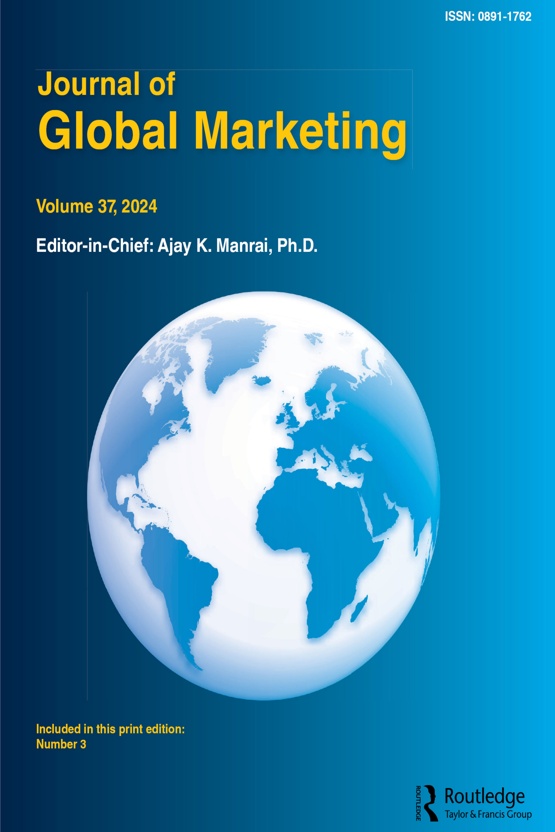Submit a Manuscript to the Journal
Journal of Global Marketing
For a Special Issue on
Managing brands across countries in times of disruption
Manuscript deadline
10 March 2025

Special Issue Editor(s)
Mahabubur Rahman,
Rennes School of Business, France
[email protected]
Anwar Sadat Shimul,
Curtin University, Australia
[email protected]
Md Tarique Newaz.,
University of Wisconsin-Green Bay, USA
[email protected]
Managing brands across countries in times of disruption
A shift in strategic stance is essential for brand innovation, entailing the reconstitution and reconfiguration of existing strategies in tandem with the dynamics of the external environment. Failure to synchronize a brand’s strategic orientation with changes in the marketplace may engender obsolescence and irrelevance, stifling the growth potential of a brand (Aaker, 2023). Several major disruptive forces are shaking up the external environment, inducing brand managers to reconfigure their brand management strategies. These transformational forces can be divided into four broad themes: a) Technological (i.e., the emergence of new technologies), b) Societal (i.e., collaborative consumption), c) Natural (i.e., climate change), and d) Geopolitical (i.e., nationalism) (Rust, 2020; Wichmann et al., 2022).
As brands respond to the disruptive environment, it is crucial to identify and address sensitivities among key customer segments to improve the brand’s strategic position (Barnes & White, 2024). In such a disruptive environment, brand managers constantly face the challenges of leveraging strategic disruption, effective repositioning, and competitive strength for brand growth. For instance, in a rapidly changing environment, such as in the fashion industry, brands must continually reassess their business models against innovative practices to identify opportunities for differentiation (Jin & Shin, 2020). Even beyond product design and innovation, brands may also face disruption in the distribution and supply chain management whereby consumers seek alternative options or switch to another brand (Tsao et al., 2019). Adding more complexities, societal disruptions, including collaborative consumption, the sharing economy, and shifts in consumer behavior, are reshaping market dynamics and influencing brand perception and loyalty (Benoit et al., 2017). Embracing issues like climate change, commercial risk, and opportunity recognition in a corporate-level strategy not only garners favourable reactions from stakeholders (e.g., customers, suppliers, lenders) but also augments brand equity and creditworthiness (Rahman et al., 2023). Moreover, rising nationalism, trade wars, and political instability pose significant challenges for global brands (Izberk-Bilgin, 2012). Taken together, scholarly attention is required to comprehensively examine how brands can navigate these disruptions while maintaining a cohesive brand identity across different markets.
This special issue aims to shed light on the aforementioned disruptive changes (and challenges) that are transforming brand management strategies and the consumer-brand relationship in both B2C and B2B markets. This special issue is interested in contributions within the following broad themes in cross-country settings, including examples of potential topics (but not limited to the themes mentioned below):
• Impact of disruptive technologies on brand management
• Branding and corporate environmentalism in the context of climate change
• Navigating geopolitical risks in global brand management
• Cross-cultural communication and storytelling in times of disruption
• Integration of AI and big data analytics in brand strategy
• Impact of diversity, equity and inclusion (DEI) on brand strategy
• Consumer-brand (re)identification during disruptive events
• Crisis management (e.g., brand/celebrity transgression) and reputation recovery strategies
• Role of social media and digital transformation (e.g., chatbot) in shaping brand
perceptions during disruptions
• Ethical branding toward social welfare and consumer well-being
• Influence of political and economic instability on brand positioning
• Adaptive brand strategies for emerging markets
• Brand collaboration and partnerships in times of disruption
This special issue invites studies that make conceptual, empirical, or theoretical advances. This issue is open to quantitative and qualitative empirical studies, conceptual articles, and systematic literature reviews. We are particularly interested in studies that adopt an interdisciplinary approach.
Looking to Publish your Research?
Find out how to publish your research open access with Taylor & Francis Group.
Choose open accessSubmission Instructions
Submission Process: Manuscripts should be submitted through the Journal of Global Marketing’s online submission system. The system will open for submissions on January 10th, 2025.
All submissions will undergo a double-blind peer review process. Please follow the journal’s submission guidelines for formatting and referencing: https://www.tandfonline.com/action/authorSubmission?show=instructions&journalCode=wglo20
Submission starts: January 10, 2025
Submission deadline: March 10, 2025
Please contact lead Guest Editor Mahabubur Rahman with any questions, [email protected]